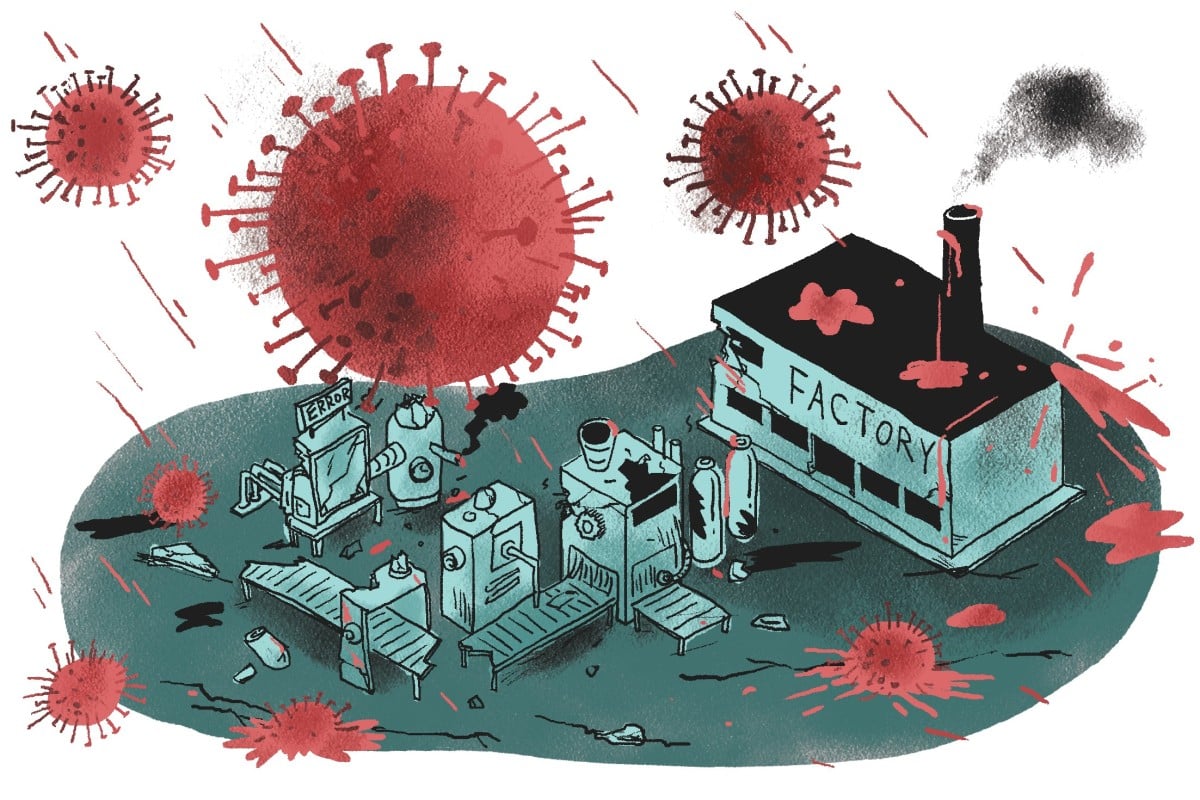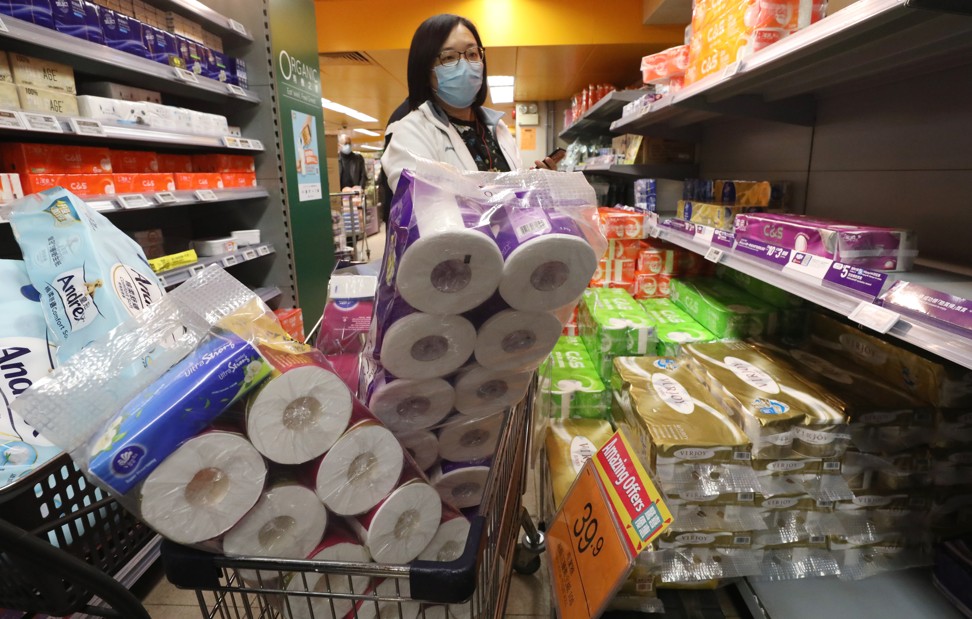The Coronavirus Is A
Nightmare For The
Global Economy
Global consumers reel from
China’s coronavirus
containment as stop-work
orders disrupt supplies of
iPhones, Hyundai cars and
toilet paper
-
South Korean carmakers are the first of China’s global customers to feel the impact of the Chinese government’s efforts to contain the spread of the coronavirus
-
Three of South Korea’s five carmakers halted their production because they could not get crucial components from their Chinese suppliers, whose factories are sitting idle amid the outbreak in China

SCMP,
8 March, 2020
A message went up in the WeChat discussion group shared by residents of The Belcher’s apartment complex in Hong Kong’s Pok Fu Lam district on Wednesday morning. “Toilet paper rolls are running out!” said the post.
As word spread among the estimated 7,000 residents living in The Belcher’s six tower blocks, households rushed into nearby supermarkets to replenish their
stockpiles. By the day’s end, every grocer, pharmacist and supermarket in the
neighbourhood had run out of toilet paper, sanitary towels and alcohol wipes,
adding to the tally of essential goods and staples that are already in short supply as Hongkongers hunker down for their second month of a global viral outbreak.
“Factories on the mainland are shutting for extended periods, so there can be no telling how long the current supply can last,” said Harrison Lee, a local accountant whose entire office is under orders to work from home amid the coronavirus outbreak. “We depend on the mainland for almost everything we eat, or use everyday, so we have to be extra vigilant about signs of disruption.”
Factories in mainland China had been the largest supplier of goods to Hong Kong since 1982, providing 46 per cent of the city’s 2018 imports. The panic hoarding of toilet paper in a Hong Kong neighbourhood offers a glimpse of how China’s manufacturing prowess – the country is dubbed the “world’s factory” for
everything from clothing to cars to smartphones and toys – is being emaciated, as the government ordered assembly workers to stay home to contain a coronavirus outbreak. The disease, which can be traced to the Hubei provincial capital of Wuhan, has afflicted 31,453 people around the world at last count, killing 638, most of them in mainland China.
8 March, 2020
A message went up in the WeChat discussion group shared by residents of The Belcher’s apartment complex in Hong Kong’s Pok Fu Lam district on Wednesday morning. “Toilet paper rolls are running out!” said the post.
As word spread among the estimated 7,000 residents living in The Belcher’s six tower blocks, households rushed into nearby supermarkets to replenish their
stockpiles. By the day’s end, every grocer, pharmacist and supermarket in the
neighbourhood had run out of toilet paper, sanitary towels and alcohol wipes,
adding to the tally of essential goods and staples that are already in short supply as Hongkongers hunker down for their second month of a global viral outbreak.
“Factories on the mainland are shutting for extended periods, so there can be no telling how long the current supply can last,” said Harrison Lee, a local accountant whose entire office is under orders to work from home amid the coronavirus outbreak. “We depend on the mainland for almost everything we eat, or use everyday, so we have to be extra vigilant about signs of disruption.”
Factories in mainland China had been the largest supplier of goods to Hong Kong since 1982, providing 46 per cent of the city’s 2018 imports. The panic hoarding of toilet paper in a Hong Kong neighbourhood offers a glimpse of how China’s manufacturing prowess – the country is dubbed the “world’s factory” for
everything from clothing to cars to smartphones and toys – is being emaciated, as the government ordered assembly workers to stay home to contain a coronavirus outbreak. The disease, which can be traced to the Hubei provincial capital of Wuhan, has afflicted 31,453 people around the world at last count, killing 638, most of them in mainland China.

A shopper stocks up on sanitary products at the Taste supermarket in Wan Chai, amid the coronavirus outbreak on 5 February 2020. Photo: Nora Tam
To
contain the transmission of the disease, the Chinese government has
extended the nationwide public holiday for the Year of the Rat in the
lunar calendar, and ordered companies and factories across 17 cities
and provinces to stop operating until February 9, forcing an
estimated 50 million people to stay home. As a result, factories are
sitting idle, and the effects are beginning to show up in far-flung
corners of the global supply chain, from Apple’s iPhones to Hyundai
Motor’s cars, fuelling Hong Kong’s panic over toilet paper.
“The
greater the disruption in China, the more likely it is to spread
overseas,” Capital
Economics’
chief emerging markets economist Neil Shearing said in a Reuters
interview.
“Given
that China is now at the heart of many global supply chains, this
will have knock-on effects around the world.”
Infographics:
2019 coronavirus surpasses 2003 Sars outbreak in afflictions
This
isn’t China’s first brush with an epidermic. Seventeen years ago
in 2003, southern
China’s
Guangdong province was the source of the global outbreak of the
severe acute respiratory syndrome, or Sars, which sickened 8,098
people in 17 countries, killing 774 patients.
This
year’s outbreak, which like the 2003 disease is linked to a
coronavirus, has surpassed
Sars
in affliction. The difference though, is China’s role in global
manufacturing and the economy’s heft in world trade.
https://www.bloomberg.com/news/articles/2020-02-07/apple-extends-store-closures-in-china-over-coronavirus?srnd=premium-europe
There is a very good discussion of the issues here
Flu Frenzy: Panic Buying
Empties Asian Store Shelves




No comments:
Post a Comment
Note: only a member of this blog may post a comment.